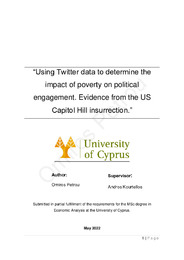| dc.contributor.advisor | Kourtellos, Andros | en |
| dc.contributor.author | Petrou, Omiros | en |
| dc.coverage.spatial | Cyprus | en |
| dc.creator | Petrou, Omiros | en |
| dc.date.accessioned | 2022-06-22T09:41:25Z | |
| dc.date.available | 2022-06-22T09:41:25Z | |
| dc.date.issued | 2022-06-10 | |
| dc.identifier.uri | http://gnosis.library.ucy.ac.cy/handle/7/65303 | en |
| dc.description.abstract | Social media websites have established themselves as an essential part of our daily lives, where people can share their opinions on any topic of their interest, and have been consistently growing over the last decade. It is estimated that in 2017 the number of social media users worldwide was 2.86 billion and it is expected to reach 4.41 billion by 2025[1]. Despite their exponential growth and the large volumes of data that are generated, big data, that is, data generated from social media networks, have not yet established its significance and are not being utilized to the degree one could think, especially in academic literature. In recent years, however, this has changed, as more and more academic papers using data from the social media website Twitter have made their debut. In this thesis, we attempt to investigate the role of poverty on the decision of Twitter users to politically engage/express themselves once an unprecedented event is realized. The objective is to classify geographical areas in the United States as high or low poverty areas on the county level, and then using the global position system (GPS) we identify the location of users at the time they sent a tweet. We then proceed by aggregating the total volume of tweets sent across all areas of interest for the period we investigate. By employing a dynamic panel model to control for intrinsic characteristics across counties and time effects to control for changes, we identify that poverty on the county level is a contributing factor to the decision of Twitter users to politically engage/express themselves during the US Capitol Hill insurrection. | en |
| dc.language.iso | eng | en |
| dc.publisher | Πανεπιστήμιο Κύπρου, Σχολή Οικονομικών Επιστημών και Διοίκησης / University of Cyprus, Faculty of Economics and Management | |
| dc.rights | CC0 1.0 Universal | * |
| dc.rights | info:eu-repo/semantics/openAccess | en |
| dc.rights | Open Access | en |
| dc.rights.uri | http://creativecommons.org/publicdomain/zero/1.0/ | * |
| dc.title | Using Twitter data to determine the impact of poverty on political engagement. Evidence from the US Capitol Hill insurrection. | en |
| dc.type | info:eu-repo/semantics/masterThesis | en |
| dc.contributor.committeemember | Zachariadis, Marios | en |
| dc.contributor.department | Τμήμα Οικονομικών / Department of Economics | |
| dc.subject.uncontrolledterm | SOCIAL MEDIA DATA | en |
| dc.subject.uncontrolledterm | TWITTER | en |
| dc.subject.uncontrolledterm | DYNAMIC PANELS | en |
| dc.subject.uncontrolledterm | GIS | en |
| dc.subject.uncontrolledterm | INSURRECTION | en |
| dc.author.faculty | Σχολή Οικονομικών Επιστημών και Διοίκησης / Faculty of Economics and Management | |
| dc.author.department | Τμήμα Οικονομικών / Department of Economics | |
| dc.type.uhtype | Master Thesis | en |
| dc.contributor.orcid | Kourtellos, Andros [0000-0001-9662-0420] | |
| dc.gnosis.orcid | 0000-0001-9662-0420 | |


